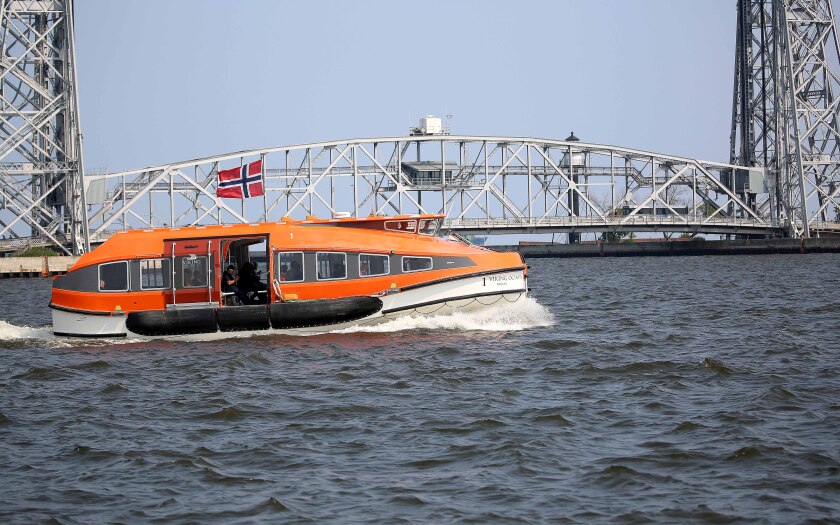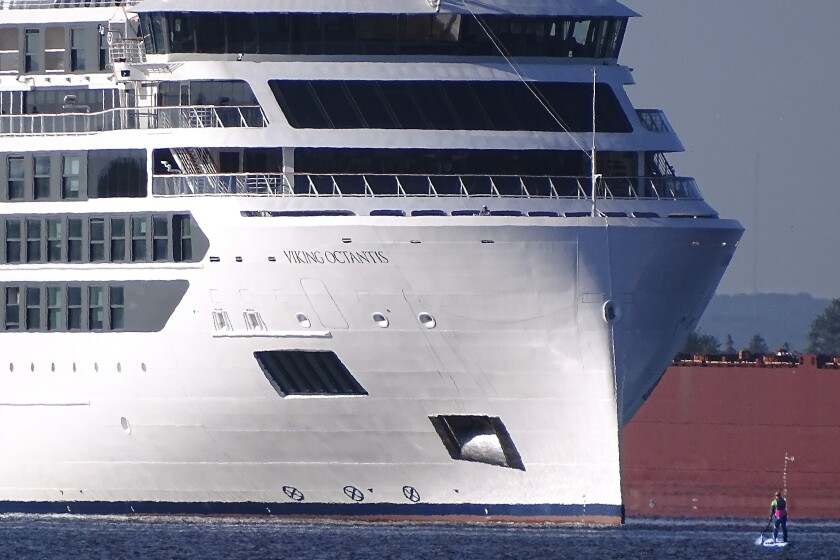
Posted on February 19, 2024
City officials continue to invest in Great Lakes cruising even as a major travel publication advises readers to steer clear of Lake Superior due to concerns over its degradation.
This week, the Duluth Economic Development Authority approved up to $74,100 in funding to draw up plans to dredge in front of the Duluth Entertainment Convention Center so that cruise ships can safely navigate to a shoreside U.S. Customs and Border Control facility. While bids have yet to be solicited, the actual cost of dredging is expected to come in at about another $650,000.
At present, larger cruise ships with greater drafts are unable to tie up alongside the DECC because of insufficient water depths. Instead, the vessels anchor at a distance, and then passengers must be carried to shore by tender boats.
This added complication puts Duluth at a disadvantage to other cruise port destinations on the Great Lakes, said Anna Tanski, tourism director of Cruise the Great Lakes. She noted that it creates added costs for cruise ship operators, diminishes the passengers’ experience and results in less time onshore, where visitors could do more to stimulate the local economy.
The challenges of coming and going also make Duluth a less attractive spot for cruise ship operators to begin and end trips, Tanski said.
She noted that points of embarkation or disembarkation typically reap the biggest economic benefits from cruise ship travelers, including increased lodging, dining, transportation and entertainment revenues.
Tanski said cruise ship passengers often “bookend” their trips with extended stays of a day or two, creating a unique opportunity for what she called “turnaround ports.”
“Dredging is a really key component for us to be able to grow cruising to the levels that are needed to be able to really foster and support this burgeoning industry,” said Tricia Hobbs, a senior economic planner and head of Duluth’s Tourism Collaborative team.
But not all are excited to see Lake Superior’s popularity growing.
Fodor’s Travel has placed Lake Superior on its 2024 “No List,” of tourist destinations, citing pollution, the introduction of invasive species and global warming concerns that have led to recent algal blooms on what is largely regarded as the most pristine of the Great Lakes.

A passenger tender from the Viking Octantis travels in the Duluth Harbor near the Aerial Lift Bridge on Aug. 18 while returning to the cruise ship.
Fodor’s Editor in Chief Jeremy Tarr wrote: “The No List isn’t a hit piece. It’s not a round-up of spots we revile, but a declaration of places we revere.”
“We love these destinations. And we know you love them, too. But our frenzied admiration and incessant need to experience them are not sustainable,” he said.
Tanski said members of the Great Lakes cruise industry are well aware of the need to protect the environment and remain committed to doing so. She pointed to a sustainability pledge taken to keep waste out of the environment, reduce carbon emissions and source food locally, when possible, as evidence of that commitment.
“To be on a ‘no list’ is quite unfortunate. Our members know we have responsibilities that we take very seriously,” she said.
DEDA held a special meeting Wednesday to address the city’s dredging needs in support of cruise ship operations. Given the significant lead time involved in obtaining needed dredging permits and lining up bids, time is of the essence, according to Chad Ronchetti, director of Duluth’s planning and economic development division.
He said swift action would be needed to get the dredging completed in time for the 2025 cruise season.
DEDA approved plans to fund the dredging after a bit of debate.
The body voted unanimously in support of undertaking the job. But a proposal to draw down funding in the city’s storefront loan program to fund the work met with resistance from DEDA commissioner and 5th District City Councilor Janet Kennedy.
Ronchetti said the Storefront Loan Fund was leveraged heavily during the reconstruction of the NorShor Theatre, but it has largely gone dormant since then. In fact, the city has not offered any storefront loans in years although a balance of about $575,000 remains in the account, he said.

A stand-up paddleboarder is dwarfed by the 665-foot-long Viking Octantis and the distant Edgar B. Speer in the Duluth harbor June 30, 2022.
“I understand that they’re saying there’s no storefront loan program,” Kennedy said. “But there’s storefront money, and if there’s money, there could be a program.”
She suggested those funds could be a useful resource especially for neighborhoods in western Duluth, citing the “Reimagine Spirit Valley” initiative in particular.
Kennedy cast the sole vote against a DEDA resolution to transfer $575,000 out the storefront loan fund to cover dredging costs.
Ronchetti said DEDA will be made financially whole for the transfer, as the city intends to redirect $650,000 in payments it will receive from the DECC’s customs and border control operations to the authority. Additionally, DEDA will be authorized to collect an additional $9 per passenger processed through the facility for the next decade.
Last year, more than 4,000 cruise ship travelers passed through Duluth, directly contributing nearly $600,000 to the local economy, according to Cruise the Great Lakes.
Ronchetti said that number is forecasted to climb to 9,000 passengers by 2028, generating more than $80,000 annually for DEDA.





